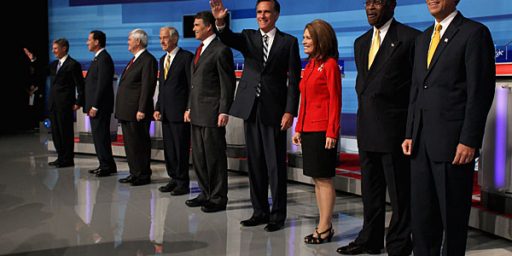Rick Perry: Radical Libertarian? Theocrat? No, Just Another Big Government Conservative
Rick Perry isn't as radical as some on the left are saying, but that doesn't mean he's any good.
Call it part of the liberal Perry Panic that Politico writes about today, call it a coincidence. But, depending on which Washington Post columnist you read today, Rick Perry is either a radical libertarian determined to roll back the Federal Government to something resembling the way it was in the late 19th Century, or he’s a big government social conservative who wants to use the power of the Federal Government to impose his version of Christianity upon you. So, which one is true, or at least closer to the truth? Let’s take a look.
First up, there’s the Ruth Marcus column that James Joyner mentioned in his post earlier today. In her column, Marcus goes through a litany of proposals that Perry made in his book Fed Up!, most of which I wrote about last week. Basically it boils down to his call to repeal the 16th and 17th Amendment, his criticism of the New Deal, and his comments about Social Security and Medicare. After listing them, Marcus reacts with typical Washington liberal stupefaction:
Whoa! These are not mainstream Republican views — at least, not any Republican mainstream post-Goldwater and pre-Tea Party. Even Ronald Reagan, who had once criticized Social Security and Medicare, was backing away from those positions by the 1980 presidential campaign.
Marcus is pretty inaccurate on this claim alone. To pick just one of the items that Perry mentions in his book, the idea of repealing the 17th Amendment has been advocated by mainstream conservatives like George Will, former Reagan Administration Bruce Bartlett, and Glenn Reynolds , [See Update below – Ed.] who is a law professor as well as being Instapundit. It’s never going to happen, of course, but suggesting that its outside the mainstream of Republican views simply isn’t true. The same thing goes for Perry’s position on Social Security and Medicare, variations on which have been advocated by conservative and libertarian public policy think tanks, and politicians, for decades. Even things like the Human Life Amendment and the Federal Marriage Amendment have been part of the conservative mileau for quite some time. The only idea that Perry brings up that I’d characterize as outside the mainstream are the proposals he makes regarding term limits for Federal judges and other legislative controls on the Judiciary. Perhaps, as James Joyner suggests, it’s just that Marcus doesn’t travel in conservative circles enough to realize that these aren’t new ideas.
So, no, Rick Perry isn’t some kind of radical libertarian. Heck I would argue, based on his record and his position on social issues, that he’s no kind of libertarian at all. Marcus’s colleague Dana Milbank agrees that Perry’s not a libertarian, instead, Milbank says, he’s a theocrat who wants to impose his religion on society:
By his own account, he is a cultural warrior, seeking to save marriage, Christmas and the Boy Scouts from liberals, gay people and moral relativism. His latest treatise, the Tea-Party-inspired “Fed Up!,” touches only briefly on matters such as abortion and gay marriage. For an eyeful of the full Perry, crack his 2008 book, “On My Honor.” While the rest of the political world was reading Cheney’s attacks on Colin Powell, I read about Perry’s attacks on gay scoutmasters.
In the book’s most talked-about passage, he likens homosexuality to alcoholism. “Even if an alcoholic is powerless over alcohol once it enters his body, he still makes a choice to drink,” Perry writes. “And, even if someone is attracted to a person of the same sex, he or she will makes a choice to engage in sexual activity with someone of the same gender.”
(…)
Perry’s politics are religious in a way not seen before in modern-day mainstream presidential candidates. “Either faith in Christ can cleanse all people of their sin, or none, but not some,” he writes. “The truth of Christ’s death, resurrection, and power over sin is absolute. . . . What we believe about it does not determine its truthfulness.”
Perry has no use for those who “want to recognize Jesus as a good teacher, but nothing more.” Of those non-Christians, Perry asks, “why call him good if he has lied about his claims of deity and misled two millennia of followers?”
On that last point, Perry essentially says he has no use for Thomas Jefferson who famously spent the better part of one year rewriting the New Testament to remove all references to Christ’s divinity or supernatural powers.
Milbank closes by pointing out the extent to whiche Perry, at least in his writing, is a culture warrior unlike any we’ve seen in a mainstream Presidential candidate before:
Though he speaks now as a small-government conservative, Perry argues in his book: “We are close to a tipping point in American society. If you believe there is right and wrong, that there are acceptable standards of behavior . . . then you have a stake in this war. If the attackers win many more victories . . . the culture war may be lost before we know it. If that happens, we will find ourselves living in a world where moral relativism reigns and individualism runs amok. Now is the time to enlist in this effort, to stand up and be counted.”
As Jacob Sullum and Marc Eisner both point out, Milbank’s use of the term “theocrat” and his evidence don’t quite add up:
The term “theocrat” suggests that Perry hopes to establish a theocracy and use the power of the state to impose God’s law. I don’t see much evidence of this in Perry. If anything—and here Marcus has it right—he seeks to embrace the core provisions of the original (and “terrifying”) constitution, thereby dramatically reducing the role of the federal government to that envisioned under Article 1.
The question then, as I noted the other day, isn’t so much what Rick Perry’s religious views are, so much as how he would apply those views to public policy, judicial selection, and the myriad of other things he could do as President. That’s a perfectly legitimate line of inquiry, but calling him a “theocrat” because he’s a fairly strict Christian is a pretty blatant misuse of the term.
Instead I’d suggest that Perry is neither a libertarian nor a theocrat. He is, in the end, a traditional big-government conservative. Evidence for this can be seen in his record as Texas Governor, which includes a history of crony capitalism disguised as economic development and, of course, the Gardisil decision. He isn’t necessarily another George W. Bush, at least not domestically, but anyone in the Tea Party who thinks he’s going to lead a revolution to cut the size and scope of the Federal Government is, most likely, kidding themselves.
Update: A correction, and an apology to the Instapundit.







Thank you Doug for admitting that which JJ refused to earlier today. (I would love to hear you 2 argue about this).
Doug, has it occurred to you he is both?
Doug, you write the oppo so well nothing needs be added.
You can’t really blame Ruth Marcus for being nostalgic for the Republican Party when it was sane, can you?
Well, given that leftism is a diffuse organic brain syndrome the more the left snarls and projects about Perry the more reasons are given for rational adults to vote for him.
Incidentally, has there ever been this much enmity directed against a candidate this far removed temporally speaking from the first primary elections, much less the general election? Think about it. Even back when George W. Bush was running in 1999-2000 the left at this stage of the game had not nearly gone into full lunatic mode. Hell, the left didn’t even start paying all that much attention to W.’s various foibles until after that whole South Carolina kerfuffle with John McCain. Contrast that with the left’s treatment of Perry. We’re still a few months away from the first primary ballots being cast. Yet we can’t go one day without a mass media outlet vomiting up something extraordinarily negative about Perry.
Makes you wonder what the internal (not for public consumption) polling data of a prospective Obama-Perry contest looks like, doesn’ t it?
In any event, Perry is what someone should expect from a Texas military guy turned Texas career politician. Pro business. Pro military. Mostly a fiscal hawk, but not shy about greasing the skids when necessary to move things along. Socially conservative. Occasionally overreaches on executive authority. Pays at least lip service to that sort of Texas, sort of western, sort of libertarian independent and anti-federal streak.
Perry falls somewhere between Ronald Reagan and George W. Bush. Obviously that’s a scarlet letter on the Internet, on college campuses and in media newsrooms, but a helluva lot of people on Main Street voted for that framework – 2x over.
Considering what Reagan did, is he to the left or right of George W. Bush? For example, he did raise taxes…
@Tsar Nicholas:
youre adorable.
@OzarkHillbilly: You can’t be both. The litmus test for Lib is simple: if you aren’t in favor of: (1) smaller gov role in economy, (2) stricter protection of civil liberties, & (3) defensive foreign policy, then you aren’t a libertarian. If liberal (or for that matter, conservative) journalists ever googled “libertarian”, they’d know that. you can’t be in favor of marriage amendments and also be a Lib. Period.
“Incidentally, has there ever been this much enmity directed against a candidate this far removed temporally speaking from the first primary elections, much less the general election?”
Hillary Clinton. Talk radio spent years anticipating her, then she lost the primary. Kind of a shame cause Rush was actually kind of funny when he went after the Clintons.
Steve
Perry like most conservatives likes to use Libertarian rhetoric to sound good when in fact he is just another conservative statist. I’m just so sick and tired of liberals and conservatives attempts at redefining libertarianism for thier own statist means.
I think Tsar just verbally fellated Rick Perry.
…a sponge who has been getting a government paycheck since he turned 18.
Of course, a “big government conservative” is no conservative at all. I wrote as much about Bush when I posted in 2003 that I could not endorse his reelection. Alas, the Dems gave us Kerry.
As for repealing the 16th and 17 amendments, I endorsed that also.
Doug you presented an interesting critique on Perry. I have to say you seem fairly unbiased in exploring the good, the bad and the ugly, all in equal doses. Some of your threads have given me more curiosity in looking up Perry’s record as well as articles written about him, as I really didn’t know too much about him except his name, before he officially announced his presidential candidacy.
However, much like Tsar indicated earlier, there is certainly a lot of press coming out on this man. Is he that formidable?
Holy mischaracterizing non sequitur, Batman! Doug, you facilely conflate Perry’s and Jefferson’s political views and their respective theologies. I don’t have much use for Jefferson’s brand of Christianity, either, because it’s not Christian, by definition. On the other hand, I greatly respect his role as the author of the Declaration of Independence and much of what he did politically during the formative years of our nation.
But you’re trying to misdirect the reader here by pointing out that Perry disagrees with Jefferson’s theology and through sleight-of-hand, imply that he disagrees with Jefferson’s political philosophy, too. Fortunately, most folks around OTB aren’t as stupid as you apparently think they are.
On the other hand, I’m pretty insulted that you think we are stupid enough to fall for your antics here.
@Jay: Jay: I was commenting on the blatant inconsistencies of Perry’s positions, not actually positing that it was possible. Sarcasm sucks on the internet.
I think the problem is your point of reference. You are saying Perry does not have radical views, because his radical views are sometimes shared on the right.
I don’t think the whole bundle is very often shared in the wider population, and you have to go pretty far right to find someone who buys them all.
Instapundit doesn’t like being lied about Doug, even when he agrees with part of your premise … you should really do your homework before posting such nonsense … I wonder how much else you just made up ?
http://pajamasmedia.com/instapundit/127311/
@Boyd:
He is always assuming stupidity … that’s the norm for Doug … sometimes he even tries to act like he’s not a true blue liberal …
“To pick just one of the items that Perry mentions in his book, the idea of repealing the 17th Amendment has been advocated by mainstream conservatives like George Will, former Reagan Administration Bruce Bartlett, and Glenn Reynolds, who is a law professor as well as being Instapundit. It’s never going to happen, of course, but suggesting that its outside the mainstream of Republican views simply isn’t true. ”
Huh? Is Glenn even a Republican? You are having such trouble supporting your position your left with naming libertarian bloggers, and ones who don’t even hold the position you claim they do?
Just because two prominent Republicans happen to support an idea doesn’t make it mainstream republican. There are lots of prominent Republicans who support legalizing pot and that doesn’t make it a mainstream Republican position. Hell, it isn’t even a mainstream Democrat position. It is a mainstream Libertarian position.
No repealing the 17th amendment isn’t a mainstream Republican position, and it isn’t even on their debating todo list.
@Boyd:
I said nothing about whether or not Perry agrees or disagrees with Jefferson’s political philosophy. Based on his record, the only philosophy I can assume Perry has is getting re-elected. I was responding to Perry’s comment that he “has no use” for anyone who doesn’t believe that Jesus was the Son of God. That means he has no use for Jefferson, or me.
@JeffC:
You did notice I already issued a correction on that right?
So, yea for you, you caught a mistake I made. I’ve made several in my 43 years. I’m sure I’ll make another some day.
Amidst the throes of horrified recoil over Perry’s personal choice of faith, shall we also remember the threat to our republic from concretized politics practiced as a secular religion?? I have been particularly alarmed by the secular crypto-church that teaches and commands the worship and practice of condescension, confiscation and eye-popping duplicity.
What has the lurid liturgy of “Bush Devil” brought to our nation? The Obama-Jesus child wrapped in the swaddling cloth of postmodern phrenology.
This economy is in crises because the nature of law and government agency is fundamentally anti-adaptive. Our nation today is best with institutional behemoths that “cannot go broke” or cannot be allowed to do so. So we perpetuate the unnatural with money that does not exist and attempt to lawyer our way through it. We would see this as insane if vanity would allow it.
What is a corpus that cannot die a natural death? A Zombie.
The pace of science, the pace of technology… well, it’s not the pace of government. It’s closer to the pace of war. The beltway syndicates are winning.
Syndicate interests are alien to individual rights. Syndicates bring the ruin of individual rights; an ending to equal protection under the law.
While the ‘conspicuously concerned’ howl the liturgy of the party line, the invasion of our personal liberties continues apace as we are infantilized by serial precautionism to morally justify our being improved by continuing legislative experimentation. All for the greater good, of course.
Yep. Just might be time to call a Texas Ranger. We bein’ attacked and stole blind by Zombies, Aliens and the carpetbaggers and crooked preachers they done paid off.
I also dislke Perry so that last post was not an attempt at a defense. I’m not a Republican and have no position on the 17th amendment either. I don’t think it obviously bad or good.
ponce, you’re factually wrong (although I doubt you’ll ever admit it or that you even care). Perry worked on his parents farm for a while after leaving the air force. Also, the implied criticism for an active duty air force pilot “collecting a government check” is silly.
Why take Milbank’s take as accurate? You should read the book. He doesn’t “essentially” say that. To the contrary, shortly after that and in summarizing the point, like that excerpted, Perry writes: “This effort [secular humanists, a term he used frequently, as well as atheists] runs counter to the beliefs of the founders of the American Republic. All of them were either active in their faiths or, at the very least, were Deists, believing in a “higher authority.”
Dusty,
Deism, especially, Jefferson’s Deism, contemplated a “Supreme Being” completely detached, and mostly unconcerned, with the affairs of man. It’s a very difference conception of a “Supreme Being” than what Perry seems to have in mind.
And, for what it’s worth, Thomas Paine was an avowed atheist, and Ben Franklin once said:
@Doug Mataconis: So, you dislike Perry so much that you’re willing to put Milbank’s words in his mouth. How disingenuous, Doug!
Milbank said “Perry has no use for those….” so you’re condemning Perry for how Milbank interpreted the passage? And to take it further, here’s how you put it in your response to me:
So to emphasize, you’re putting quotation marks around Milbank’s words, and then say it’s a Perry comment. Wow. I’m stunned. And then the rest of your sentence is flat-out wrong, too, because that’s not what Perry said, either. I don’t know how you can read Milbank’s quote from Perry’s book, quote the quote, and still blow it completely
So it appears for all the world that you’re trying to justify your misrepresentation of Governor Perry’s position by claiming that not only does he reject you, he rejects Thomas Jefferson, including his political positions, when you know good and well Perry said no such thing.
And if you don’t know it, then…well, I don’t know what to say. Actually, I do know what to say, but I’m trying to be courteous here.
(Ugh, my first response got eaten by something. So a shortened version. Please don’t mind if it seems blunt or terse.)
All that is irrelevant, isn’t it? My lesser point is that Perry knows about Deists and appeals to the wisdom of Deists, who, as you and I know, aren’t, strictly speaking, Christians. (I wouldn’t put Paine as a founder in the general sense of the term, and only some include when the net is enlarged. As for Franklin, despite your quotes, Franklin thought of himself as a Deist, per Wiki, with reference included (#78). I don’t know if it is accurate; I didn’t read Franklin’s memoir footnoted.
My major point, which I guess wasn’t emphasized enough, is not to take Milbank’s words — “no use for” — as Perry’s. Milbank has his own interests in writing that (as was his use of “non-Christians” instead of something accurate), and we should pretty well know what it is by now.
Bachman, Bachman, Bachman, Bachman. Get the hint? Am I being subtle enough?
@Dusty: Let’s not even get started on Milbank. He had been writing “news and analysis” for years at WaPo that was nothing of the sort. At least nowadays his opinions are actually labeled as opinions.
Excluding the “Bill of Rights” (the first 10 amendments) the Constitution has been amended 17 times in the 220 years since 1791.
Six, or 1/3 of those amendments, have been in my lifetime. As a Libertarian, that concerns me.
Our founding fathers deliberately made amending the Constitution a long and difficult process. Then to further complicate the process, they created a branch of the legislature, the Senate, responsible to the states with the intention that the Senators, not reliant on popular vote, could provide a dispassionate view of any potential changes to the Constitution.
I believe that a fundamental shift in our government began in 1913 when the 17th Amendment changed the method of selecting Senators.
The Senators, now subject to popular election could no longer act as that moral and legal “brake,” although their six-year terms gave them some protection from hasty and popular recall.
It’s worth noting that the first amendment passed after the 17th was the 18th, Prohibition.
Would the 18th Amendment, poorly conceived and quickly passed, been approved if the Senators were still selected by the states legislatures? It’s an interesting subject for debate.
I personally believe the Constitution has become so easy to amend because too many Senators have essentially abrogated their role as a brake to the temporary exuberance of popular sentiment.
The states legislators have been selecting senators a lot longer than we have been voting for them.
I believe we should be very cautious about what we add to our Constitution
The 17th Amendment made state legislatures less important to the Federal system. It is one of many reasons people think of the United States as one giant country, instead of a federation of states. Perhaps repeal would remind voters of that fact, perhaps not. It’s a subject that citizens should certainly be informed about, and the Amendment should be reconsidered.
It probably won’t happen since we’re currently living in a “popular vote” era – the issue would be demagogued by politicians on the left primarily, and not defended by the McCain-type Republicans.
Perry party affiliations are with radical Christians (masked at Christians) that are ANTI RELIGION, and if this wacko gets into power.. He will make Obama and BUSH look like NUNs. Backed by teh global elite, back by BOA, and other global $$$.. Dont be fooled by the smile,, there is a devil behind that smile..